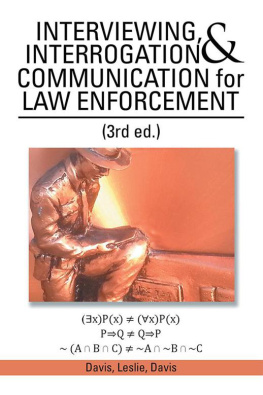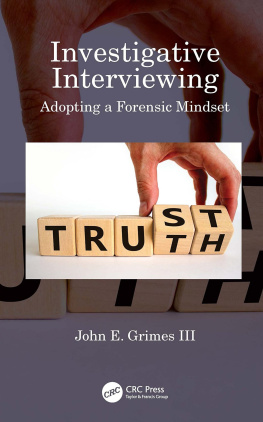John E. Hess - Interviewing and Interrogation for Law Enforcement
Here you can read online John E. Hess - Interviewing and Interrogation for Law Enforcement full text of the book (entire story) in english for free. Download pdf and epub, get meaning, cover and reviews about this ebook. year: 1997, publisher: Elsevier Science, genre: Detective and thriller. Description of the work, (preface) as well as reviews are available. Best literature library LitArk.com created for fans of good reading and offers a wide selection of genres:
Romance novel
Science fiction
Adventure
Detective
Science
History
Home and family
Prose
Art
Politics
Computer
Non-fiction
Religion
Business
Children
Humor
Choose a favorite category and find really read worthwhile books. Enjoy immersion in the world of imagination, feel the emotions of the characters or learn something new for yourself, make an fascinating discovery.

- Book:Interviewing and Interrogation for Law Enforcement
- Author:
- Publisher:Elsevier Science
- Genre:
- Year:1997
- Rating:4 / 5
- Favourites:Add to favourites
- Your mark:
- 80
- 1
- 2
- 3
- 4
- 5
Interviewing and Interrogation for Law Enforcement: summary, description and annotation
We offer to read an annotation, description, summary or preface (depends on what the author of the book "Interviewing and Interrogation for Law Enforcement" wrote himself). If you haven't found the necessary information about the book — write in the comments, we will try to find it.
Interviewing and Interrogation for Law Enforcement
Interviewing and Interrogation for Law Enforcement — read online for free the complete book (whole text) full work
Below is the text of the book, divided by pages. System saving the place of the last page read, allows you to conveniently read the book "Interviewing and Interrogation for Law Enforcement" online for free, without having to search again every time where you left off. Put a bookmark, and you can go to the page where you finished reading at any time.
Font size:
Interval:
Bookmark:
Interviewing and Interrogation for Law Enforcement, Second Edition
Copyright 1997, 2010
Matthew Bender & Company, Inc., a member of the LexisNexis Group
New Providence, NJ
ISBN: 978-1-4224-6325-3
Phone 877-374-2919
Web Site www.lexisnexis.com/anderson/criminaljustice
All rights reserved. No part of this book may be reproduced in any form or by any electronic or mechanical means, including information storage and retrieval systems, without permission in writing from the publisher.
LexisNexis and the Knowledge Burst logo are trademarks of Reed Elsevier Properties, Inc.
Anderson Publishing is a registered trademark of Anderson Publishing, a member of the LexisNexis Group.
Library of Congress Cataloging-in-Publication Data
Hess, John E., 1941
Interviewing and interrogation for law enforcement / John E. Hess. 2nd ed.
p. cm.
Includes bibliographical references and index.
ISBN 978-1-4224-6325-3
1. Interviewing in law enforcementUnited States. 2. Police questioningUnited States.
I. Title.
HV8073.H48 2010
363.254dc22 | 2010006843 |
Cover design by Tin Box Studio, Inc. | EDITOR Elisabeth Roszmann Ebben |
ACQUISITIONS EDITOR MichaelC. Braswell |
To my wife, Jean, for her faith and patience, and with thanks to Pat, Sue, Margo, Steve, and Ursula.
Nearly one-quarter of a century of wrestling with the problem of obtaining information from other people, often with little or no success, has caused me to reach out to many sources for help. Most of what I know about the topic I learned from these sources, but often I am unable to pinpoint exactly where, when, or how I acquired this knowledge. However, I suspect that much of it came from multiple sources through the years, and has melded into one eclectic philosophy.
Although nearly 15 years as a field agent contributed to my knowledge of interviews and interrogations, much of what I learned came from other sources, including the publications listed at the end of each chapter. While a few of them might qualify as references, most represent a sampling of the material that has influenced my philosophy of this topic and primarily are provided for the reader who desires more detailed coverage of the material.
However, information obtained from all the publications pales when compared with the insight and knowledge provided by the many practitioners, a few of whom are named below, I have encountered. Warren Holmes in his presentations at the FBI Academy showed that interrogators can also be teachers. His years of experience as a polygrapher and interrogator give him credibility that few others have. Joseph Buckley and other members of John E. Reid and Associates, through their training programs throughout the country, have done much to advance the level of interviewing and interrogation in both the public and private sector. Joseph Kulis, a psychologist who has worked with the Chicago Police Department for many years, has managed to bridge the gap between the clinician and the police officer. He provides practical advice for dealing with human nature. James Earle, Joseph Kenney, and Ron Hilley, all FBI agents, all polygraphers, and most important, all teachers, have provided more knowledge and insight than I can ever calculate.
Finally, I must give credit to the thousands of students, rookie and veteran, local and international, who have shared their experiences with me over the years. I would have needed several lifetimes to gain firsthand all the knowledge that these students and the other sources have provided.
Hey Joe, got your yearly letter from that creep, I see, growled Al as he sorted through the stack of incoming papers in their mutual mail box. Joe and Al had been assigned to the homicide squad for more than 12 years, and although their methods differed, each had put his share of killers in jail during that time.
Joe glanced at the letter Al had tossed to him, opened it and began reading:
October 14
Dear Joe,
Its been just over five years now, and I just wanted to let you know I still havent forgotten what you did for me. If it hadnt been for you...
You know, Joe, interrupted Al, Ill never figure that one out. We had nothing on that guy. There wasnt a shred of evidence that he had killed that girl. God knows I tried to find some; I beat the bushes for months for nothing no witnesses, no forensics, nothing. He knew it too because when I realized we had nothing to lose, I took a shot. I tried to convince him that we had enough to hang him. He just laughed and told me to go ahead and try it.
Then you come along and shoot the breeze with him, and he spills his guts even though you didnt have a damn thing to offer him. If I live to be a hundred, Ill never understand.
Joe resumed his reading:
... I would have remained a prisoner, just like you said. Not behind a wall, but in my own mind, and that would have been far worse. Deep down, I knew it all the time, but you were the one who helped me admit it. Nobody else understood or cared.
Thanks for setting me free. Come see me sometime if you get a chance; Ill be here.
Billy G.
State Prison
Lasers, DNA analysis, and other high-tech procedures have recently bombarded the world of law enforcement. Through their use, some criminals who might have remained free have gone to jail. Not surprisingly, such cases often receive extensive publicity and, unfortunately, tend to overshadow reality. Investigators, not scientists, solve the vast majority of crimes, and they do so because somebody talked. Witnesses, accomplices, or the criminals themselves usually provide the solutionssolutions that are not obtainable through any high-tech process.
However, criminals rarely come forth voluntarily to provide these solutions, and witnesses often have no enthusiasm for becoming involved. Despite this, law enforcement agencies still manage to obtain these truly spectacular, but unpublicized results, and they do so through the efforts of a few investigators who have learned how to interview. Increasing law enforcements cadre of competent interviewers will do more to solve crimes than any technological advance ever will.
Despite the track record of investigators solving cases through interviewing, few agencies place much emphasis on the development of the skills involved in interviewing. They offer many reasons for this policy of indifference, and each explanation has an element of truth sufficient to sustain it. However, scrutiny of these reasons will dispel their validity and expose them for what they are: Myths. These myths range from the philosophical, such as assuming that good interviewers are born, not made, to the tactical, such as believing that interviews consist solely of questions and answers. We must eliminate these myths as a first step in expanding the pool of competent interviewers.
The fictional Sergeant Joe Friday of Dragnet has probably had a more detrimental impact on police interviewing than any other single person or event. Though greatly admired as an individual, Fridays technique of insisting on just the facts, despite its entertainment value, was poor interviewing. Unfortunately, many officers, rookies and veterans alike, imitate this style, not because it is effective, but because it is easy. By refusing to acknowledge a persons feelings and emotions, and instead just discussing the facts, the investigator removes much of the stress from interviewing. However, failure to deal with these feelings can also prevent the interviewer from obtaining those precious facts. Fear, anger, grief, and many other emotions serve as barriers to communication. If you deal with and remove these barriers, the facts will come. If they are ignored, the facts may remain unknown.
Next pageFont size:
Interval:
Bookmark:
Similar books «Interviewing and Interrogation for Law Enforcement»
Look at similar books to Interviewing and Interrogation for Law Enforcement. We have selected literature similar in name and meaning in the hope of providing readers with more options to find new, interesting, not yet read works.
Discussion, reviews of the book Interviewing and Interrogation for Law Enforcement and just readers' own opinions. Leave your comments, write what you think about the work, its meaning or the main characters. Specify what exactly you liked and what you didn't like, and why you think so.







